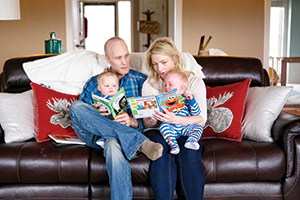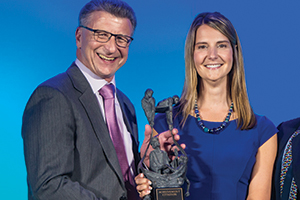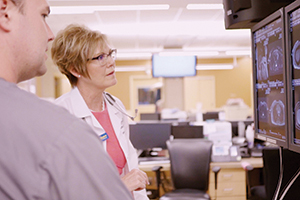By KIM VAN OOSTEN
SIOUX FALLS, S.D. — Avera Health's LIGHT program is bringing awareness to — and helping clinicians combat — one of the biggest threats to the nation's medical facilities: burnout. For its innovative approach, the program earned CHA's Achievement Citation, an honor bestowed at the 2017 Catholic Health Assembly.

Dr. Justin Sharp, a neonatologist with Avera Medical Group, is medical director for Avera Health’s LIGHT program. LIGHT addresses physician burnout in part by promoting work-life balance. Sharp’s wife, Jessica, a life-coach for medical residents and physicians, says she appreciates the LIGHT program’s emphasis on physician wellness. Here the couple read to their twin boys, Journey and Haven.
Photo by Chris Ryan/© CHA
Researchers from the Mayo Clinic and the American Medical Association surveyed physicians in 2011 and again in 2014 to assess burnout, and they found that physician dissatisfaction with work-life balance continues to grow. The researchers said that in 2014, more than 54.4 percent of the 6,880 survey respondents reported experiencing at least one symptom of burnout, compared with 45.5 percent in 2011. Satisfaction with work-life balance declined precipitously as well, falling to about 41 percent in 2014 from 48.5 percent.
"If you're not healthy and well yourself, it's hard to give good care to patients," said Dr. Tad Jacobs, chief medical officer for the Avera Medical Group, which developed the LIGHT program. A self-described "country doctor," Jacobs understands that rural doctors are no more immune to burnout than their urban peers. Stress related to the use of electronic medical records, increased workloads including excessive hours on call related to lower staffing can fan frustration and contribute to emotional exhaustion in rural providers.
"If you're a specialist in a tertiary center, and your call scenario is keeping you away from your family and the things that you want to do, that's a huge thing," Jacobs said.
Rural isolation
Mary Wolf directs LIGHT and Avera Health's employee assistance program. She said nurse practitioners and physician assistants with rural practices can have the added stress of feeling isolated from their peers, so LIGHT offers peer support coaching to them as well as to physicians.
Rural providers such as Avera Health, which is based in Sioux Falls and serves South Dakota and surrounding areas in the upper Midwest, have a tougher time than their urban counterparts recruiting physicians, and clinicians with advance practice licenses. "We want them to stay with us for their practice career," Jacobs said. Job satisfaction is key to that.
Turning on the LIGHT
Avera LIGHT is a voluntary set of programs designed with the long-term well-being and retention of physicians, physician assistants and nurse practitioners in mind.
LIGHT is an acronym for what the program teaches: Live, Improve, Grow, Heal and Treat. Through courses and coaching, the goal is to reduce or prevent burnout by providing strategies to build resiliency, encouraging enjoyment of job and home, implementing practice changes and creating improved work-life balance, Wolf explained.
Services touch people from the beginning to the end of their careers, from residency to retirement, Wolf said, and include, in part:
- Executive coaching for those taking on increased or different responsibilities, working to improve communications among clinical teams and/or system leadership, balancing commitments at work and home, defining priorities based on values or building personal resiliency
- A couple's retreat
- No-agenda socials, where physicians and physician assistants gather for refreshments and conversation
- Schwartz Rounds, a gathering to process the social and emotional aspects of being health care providers
- Continuing medical education credits for completion of courses on wellbeing strategies, such as mindfulness

Dr. Tad Jacobs and Mary Wolf accept CHA’s Achievement Citation at the 2017 Catholic Health Assembly in New Orleans. Jacobs is chief medical officer for the Avera Medical Group, which developed the LIGHT program. Wolf directs LIGHT and Avera’s employee assistance program.
Photo by Jerry Naunheim Jr./© CHA
Women of spirit
Dr. Karen Garnaas, a neurologist and chief of staff at Avera McKennan Hospital & University Health Center in Sioux Falls, connected with Wolf during her own struggle with burnout. For Garnaas, spirituality and authentic relationships reflecting her Christian beliefs were core to her recovery plan. Together with Wolf, she proposed and helped organize a "Women in Medicine" conference on Oct. 21-22 to connect Avera's female clinicians — both physicians and advanced practitioners for spiritual renewal. Participants in the inaugural event asked Avera to offer the conference annually.
Garnaas said in her experience, women feel guilty making time for themselves including time to build relationships with colleagues because time is their most precious commodity. A wife and mother of five, she structured the conference to allow female providers to make supportive connections.
"We're all struggling with the same sort of things. Which often is the thought of, 'Am I enough?' Because we're trying to wear multiple hats at the same time. We are trying to be the doctor, leader, administrator, researcher, but we really at our heart want to be the best mom and the best spouse that we can be," she said.
Proactive, not just prescriptive
Garnaas said LIGHT's proactive approach is changing the culture of providers at Avera. "It's not designed to just strictly help the floundering providers that are circling the drain and confused as to why they're doing what they're doing. It's really designed to give people many different strategies to be whole," she said. "That should be something that we embrace right at the beginning instead of waiting until we're at a moment of crisis."

Dr. Karen Garnaas, here looking at scans, a neurologist and chief of staff for Avera McKennan Hospital and University Medical Center, is the mother of five. She proposed and helped plan the LIGHT program’s Spirituality and Women in Medicine conference.
Photo by Chris Ryan/© CHA
And that cultural shift — a desire and a means to get upstream of burnout — might be the most important benefit of LIGHT because even as doctors encourage their patients to share concerns about depression, anxiety and irritability, they themselves are less likely to seek help for those same concerns. Stigma and a superhero mind-set can be part of the reluctance to seek help, but many states require physicians to report any mental diagnosis of their own — no matter how mild or treatable, or how far in the past &mdah; to their state medical licensing board. Results of a survey completed by 2,106 female physicians and published in the November-December 2016 issue of General Hospital Psychiatry confirm this. Roughly one in two respondents believed they met the criteria for mental illness but said they had not sought treatment due to the stigma of mental illness, fear of potential repercussions from reporting such treatment to a medical licensing board, time constraints or a belief they could manage their illness on their own.
Wolf said LIGHT services are confidential and allow providers to reach out for help without the penalty of having to report it on their licensure renewal applications. Coaching does not have to be reported since it is not mental health counseling. Physicians and advance practice providers who train as peer support strategists provide the coaching. The LIGHT program offers referrals to behavioral health providers as needed.
|
LIGHT program includes emotional prep for retirement
Avera Health's LIGHT program is intended to support the emotional well-being of physicians, physician assistants and nurse practitioners from residency through long careers. And, when those careers start to wind down, LIGHT can help clinicians transition to retirement.

As she begins to mentally prepare to make the most of retirement, Dr. Jane Gaetze has picked up some pointers attending LIGHT programing offered by Avera Health.
One physician looking forward to retirement is Dr. Jane Gaetze, an obstetrician and gynecologist who has been employed by Avera Health for 20 years. "I have an identity as a mom, as a physician, as a wife," she said. "All of those get mixed up." While she is not retiring yet, she has attended the LIGHT retirement program to help her mentally prepare to readjust her priorities and take advantage of newfound time to travel with her husband and be more available to their adult children.
In her experience retirement is easier for some people than others.
"I have had several of my physician friends retire," she said. "One of them came up to me after he had retired, and he looked me in the eyes, and he said, 'Jane, don't ever retire.' Both of us shed some tears because it was very, very obvious for him he really was not making an easy time of his retirement."
Alternatively, she said she knows other physicians who have flourished in retirement, and she hopes to count herself among that group. Those individuals achieved at least some modicum of work-life balance before retirement, developing hobbies or interests outside of their medical practices, and they continue to find meaning and enrichment in those activities now that they are retired. Gaetze said the LIGHT program got her started thinking in more concrete terms about what comes next, and she and her husband are talking about things they can enjoy together.
|
Copyright © 2017 by the Catholic Health Association
of the United States
For reprint permission, contact Betty Crosby or call (314) 253-3490.